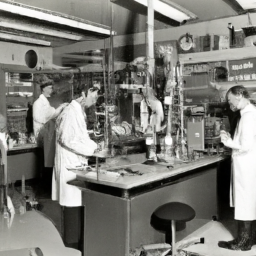In recent years, the importance of understanding space weather has become increasingly evident, particularly as it poses significant risks to our technological infrastructure on Earth and in space. A NASA-sponsored initiative at the University of Iowa (UI) is spearheading efforts to enhance the nations capabilities in producing high-fidelity magnetic field measurements. These measurements are crucial for investigating space weather phenomena that can disrupt communication systems and power grids, as well as affect satellites and other assets in orbit. Space weather refers to the environmental conditions in space that can influence the Earths magnetosphere, ionosphere, and thermosphere. This includes solar flares, coronal mass ejections, and high-energy particles emitted by the sun. The impact of these events can range from minor disruptions in satellite operations to severe geomagnetic storms that can lead to widespread power outages. In my experience, the increasing reliance on technology makes it imperative to develop reliable methods for monitoring and predicting these space weather events. The University of Iowas project focuses on the development of high-fidelity fluxgate cores, which are essential components in the measurement of magnetic fields. Fluxgate magnetometers are widely used in space science due to their sensitivity and accuracy. They function by detecting changes in magnetic fields, which can indicate the presence of solar activity. The restoration and advancement of these technologies are vital as they enable scientists to gather precise data about the magnetic environment in space. According to official reports, the UI team is not only restoring existing technologies but also innovating new methods to enhance measurement capabilities. This involves the integration of advanced materials and techniques that improve the performance of fluxgate cores. Research confirms that the use of high-quality materials can significantly enhance the sensitivity and stability of these instruments, allowing for more accurate readings of magnetic field variations. Industry experts note that the need for high-fidelity measurements is underscored by recent events. For instance, in 2021, a geomagnetic storm caused by a coronal mass ejection led to temporary disruptions in satellite communications and navigation systems. Such incidents highlight the importance of having robust monitoring systems in place. The UI project aims to address these challenges by providing the scientific community with the tools necessary to better understand and predict space weather phenomena. The implications of this research extend beyond academic interest. As space missions become more ambitious, the need for reliable magnetic field measurements grows. For example, missions to Mars and beyond require precise navigation and communication systems that can withstand the harsh conditions of space. The development of high-fidelity fluxgate cores is crucial for ensuring the success of these missions, as they provide essential data for spacecraft navigation and operation. Moreover, the advancements in fluxgate technology have potential applications in various fields, including Earth-based industries. For instance, the energy sector relies heavily on accurate magnetic field measurements to protect infrastructure from geomagnetic storms. Government data shows that a severe geomagnetic storm could result in billions of dollars in damages to power grids. By improving our understanding of space weather, we can better prepare for and mitigate these risks. In addition to technical advancements, the project at the University of Iowa also emphasizes collaboration with other institutions and agencies. By working together, researchers can share knowledge and resources, leading to more comprehensive solutions to the challenges posed by space weather. This collaborative approach is essential for fostering innovation and ensuring that the latest findings are translated into practical applications. As observed, the field of space science is rapidly evolving, and the demand for high-quality data is greater than ever. The UI teams efforts to restore and advance fluxgate core technology represent a significant step forward in our ability to monitor and understand the complex interactions between solar activity and the Earths magnetic field. This research not only enhances our scientific knowledge but also contributes to the safety and reliability of technological systems that millions of people depend on daily. Looking ahead, the implications of this work are profound. Experts agree that as our reliance on technology continues to grow, so too does the need for effective monitoring of space weather. The advancements being made at the University of Iowa will likely play a critical role in shaping future space missions and improving our resilience to space weather events. By investing in high-fidelity measurement technologies, we are not only safeguarding our current systems but also paving the way for future exploration and innovation in space science. In conclusion, the initiative at the University of Iowa to develop high-fidelity fluxgate cores is a vital contribution to our understanding of space weather and its impacts. Through advanced research and collaboration, this project aims to enhance our capabilities in measuring magnetic fields, thereby improving our preparedness for the challenges posed by solar activity. As we continue to explore the cosmos, the importance of reliable data cannot be overstated, and efforts like these are essential for ensuring the safety and success of our technological endeavors in space.
TRENDING NOW
WORLD
Global Messaging Trends: Can Local Apps Like Arattai Overtake Giants?
44% 🔥
POLITICS
Accusations fly over whether Republicans or Democrats 'own' shutdown
35% 🔥
POLITICS
Rep. Mike Haridopolos, R-Fla., talks about the government shutdown
34% 🔥
POLITICS
What happens now that the government has shut down. And, a pricing deal with Pfi...
26% 🔥
POLITICS
Married, but no connection: Reality of silent divorces in Indian homes
31% 🔥
POLITICS
Netanyahu's apology to Qatar, phone on Trump's lap: A telling White House photo
38% 🔥
MOST READ
SPORTS
Week 5 NFL odds, lines, betting picks, spreads: 2025 predictions: Model backs Sa...
55% 🔥
SPORTS
Predicting every undefeated college football team's first loss: Will anyone beat...
36% 🔥
SPORTS
Tigers Lefty Tarik Skubal Deserves Second Straight AL Cy Young Award
54% 🔥
SPORTS
Jets Get Official Braelon Allen Injury Diagnosis
61% 🔥
SPORTS
Gill: India won't be 'looking for any easy options' against West Indies
49% 🔥
SPORTS
Phil Mickelson takes a jibe at golf during friendly banter with ex-LIV Golf CEO’...
39% 🔥

